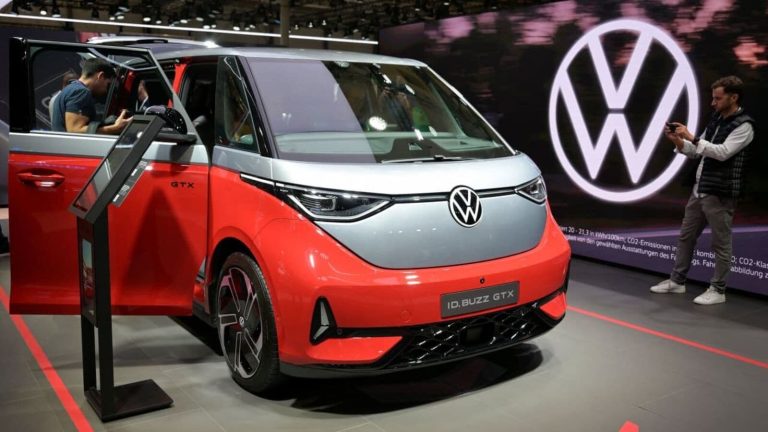Volkswagen has cut headcount in Germany by around 7,000 since starting its cost-cutting drive in late 2023 and reduced factory costs at the key VW brand, its CFO said on Wednesday on a call following its first-quarter results.
“Rest assured that we continue to drive implementation of the agreed measures with full force,” CFO Arno Antlitz said.
Europe’s largest carmaker Volkswagen said Wednesday that first quarter profit plunged due to higher costs as it warned of muted business for the rest of the year in the wake of trade tensions.
Net profit fell 40.6 percent in the first three months of the year to hit 2.19 billion euros ($2.49 billion) even as revenue rose three percent to reach 77.56 billion euros.
The 10-brand group, which apart from its namesake includes Audi, Skoda and Porsche, had warned earlier in April that one-off costs of 1.1 billion euros would weigh on its result.
These included restructuring costs at its troubled software unit as well as EU fines for selling too many polluting vehicles, Volkswagen said.
For the rest of the year, the carmaker said that it expected business “towards the lower end” of its guidance, citing challenges including increased competition, more stringent emissions regulations and trade tensions.
US President Donald Trump has threatened and imposed a variety of tariffs designed to bring manufacturing back to his home country, including a levy of 25 percent on car imports.
North America took just over 11 percent of Volkswagen vehicle deliveries in the first quarter, making it the firm’s third most important region after western Europe and China.
Speaking on a call for analysts and investors, Volkswagen’s finance chief Arno Antlitz said it was “too early to say” if Volkswagen would step up manufacturing in the United States to circumvent any tariffs.
It already has a plant in Tennessee but most of the vehicles it sells in the United States are imported.
Volkswagen expects a profit margin of between 5.5 and 6.5 percent for the coming year, but its guidance does not take account of changeable American tariffs.
“It’s highly difficult to give a projection for the full year,” Antlitz said.
Volkswagen AG’s earnings dropped by 40% in the first quarter as higher manufacturing costs cut into margins and US tariffs clouded the German carmaker’s outlook.
Earnings before tax came in at €3.1 billion ($3.5 billion) in the three months through March, down from €5.1 billion a year earlier, the company said Wednesday. Group operating margin fell to 3.7% from 6%.
Volkswagen has seen profitability drop as it confronts rising costs and excess capacity at European factories, as well as weaker demand in China, a key market. Meanwhile, purchases of electric vehicles in Europe and the US have been uneven, and President Donald Trump’s tariffs are threatening to hurt profits further.
While Volkswagen left its outlook for 2025 unchanged, it said its forecast of up to 5% sales growth didn’t factor in the impact of US tariffs. The company, however, said it now expects an operating return on sales at the lower end of its 5.5% to 6.5% targeted range.
European carmakers have struggled to assess the full impact of US tariffs as the Trump administration continues to change its position with caveats, exemptions and delays. Most recently, Trump signed an directives on Tuesday to lift some duties on foreign parts and prevent multiple levies from stacking on top of each other. The move could reduce the total tariffs imposed on VW models made in Chattanooga, Tennessee, and Puebla, Mexico, and on Audi and Porsche vehicles shipped in from Europe.
Porsche AG, Volkswagen’s luxury sports-car brand, cut its profit outlook this week, citing the impact of tariffs and weaker-than-expected sales of EVs. But uncertainty around the tariffs has led other carmakers, including Mercedes-Benz Group, Volvo Car and General Motors, to scrap their forecasts outright.
Volkswagen had pre-released its quarterly earnings earlier this month, noting that operating profit had been hit by about €1.1 billion in special items. Some €300 million of the charges were attributed to diesel issues and US tariff impact on cars shipped in March.
The German company on Wednesday said European demand for its new models has been strong, with its order backlog rising to nearly 1 million units in the first quarter.


